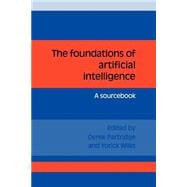
Note: Supplemental materials are not guaranteed with Rental or Used book purchases.
Purchase Benefits
What is included with this book?
| List of contributors | |
| Preface | |
| Acknowledgements | |
| Part I. Introduction: 1. What is AI anyway? Roger C. Schank | |
| 2. What kind of information processing is intelligence? B. Chandrasekaran | |
| Part II. The Formal Foundations of AI: 3. Non-monotonic reasoning versus logic programming: a new perspective Teodor C. Przymusinski | |
| 4. Prolegomena to a theory of mechanized formal reasoning Richard W. Weyhrauch | |
| Part III. Levels of Theory: 5. AI: a personal view David Marr | |
| 6. Has AI helped psychology? Margaret A. Boden | |
| 7. What's in an AI program? Derek Partridge | |
| Part IV. Programs and Theories: 8. One smal head: models and theories Yorick Wilks | |
| 9. The nature of AI principles Alan Bundy and Stellan Ohlsson | |
| 10. What's in an AI program? Derek Partridge | |
| Part V. The Role of Representations: 11. Thinking machines: can there be? are we? Terry Winograd | |
| 12. Evolution, error, and intentionality Daniel C. Dennett | |
| Part VI. The Role of Programs in AI: 13. What kind of fields is AI? Alan Bundy | |
| 14. Programs in the search for intelligent machines: the mistaken foundations of AI Eric Dietrich | |
| Part VII. Rational Reconstruction as an AI Methodology: 15. The novelties of AI: theories, rograms and rational reconstructions J. A. Campbell | |
| 16. AM: a case study in AI methodology G. D. Ritchie and F. K. Hanna | |
| Part VIII. Is AI Special in Regard to its Methodology?: 17. Is there anything special about AI? Roger M. Needham | |
| 18. What sort of a thing is an AI experiment? Karen Sparck Jones | |
| 19. We need better standards for AI research John McCarthy | |
| Part IX. Does Connectionism Provide a New Paradigm for AI? 20. Why there still has to be a language of thought Jerry A. Fodor | |
| 21. Connectionism and the foundations of AI Paul Smolensky | |
| 22. Some comments on Smolensky and Fodor Yorick Wilks | |
| 23. Representation and high-speed computation in neural networks Paul M. Churchland | |
| Part X. The Role of Correctness in AI: 24. Does AI have a methodology different from software engineering? Derek Partridge and Yorick Wilks | |
| 25. AI, computer science and education Ranan Banerji | |
| Part XI. Limitations on Current AI Technology: 26. The challenge of open systems Carl Hewitt | |
| 27. Towards a reconciliation of phenomenology and AI Stuart E. Dreyfus and Hubert L. Druyfus | |
| 28. The superarticulacy phenomenon in the context of software manufacture Donald Michie | |
| Part XII. Annotated Bibliography on the Foundations of AI Imre Balogh and Brian M. Slator | |
| Index of names. |
The New copy of this book will include any supplemental materials advertised. Please check the title of the book to determine if it should include any access cards, study guides, lab manuals, CDs, etc.
The Used, Rental and eBook copies of this book are not guaranteed to include any supplemental materials. Typically, only the book itself is included. This is true even if the title states it includes any access cards, study guides, lab manuals, CDs, etc.